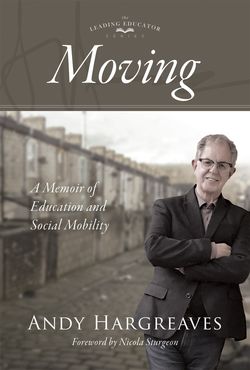Читать книгу Moving - Andy Hargreaves - Страница 13
На сайте Литреса книга снята с продажи.
What’s Worth Writing For
ОглавлениеFor a long time, I thought my life was not worth writing about. In fact, I didn’t even consider writing or not writing about it as an issue. I’ve spent a lot of my career writing about other people’s lives—mainly in schools and workplaces—but I didn’t feel I was much to write home about myself. I’m not a celebrity chef, athlete, politician, rock musician, or reality-TV star. I don’t come from royalty, I have an unspectacular ancestry, and I never had a life or a job where I hung around the rich and famous.
At the same time, I’m not a rags-to-riches person, a competitor for Frank McCourt’s Angela’s Ashes,17 or somebody who—in Monty Python’s terms—was born in a shoebox and was glad of it!18 I’m not a recovering addict, a lottery winner who won it all and then lost it, or a survivor of some immense personal tragedy. All these lives are well worth reading about. But they are not my life, my unremarkable life, a life that was never worth keeping a journal for, because who would possibly be interested in it? In the working-class culture I grew up in, we thought of ourselves as nothing special. We had dignity and self-respect, of course, but we didn’t feel we had any standout features that could put us on a pedestal above anyone else.
But the older we get, and the more we learn about other people in our families, communities, and workplaces, the more it becomes evident that we are all remarkable in some way or other. All our lives have themes that connect us with the lives of others—love and loss, triumph and tragedy, weddings and funerals, hope and disappointment, leaving home and coming back. It is these points of connection between our stories and other people’s stories that establish points of interest. Sometimes, it’s not one person’s story over another that is at issue. In the words of the 1970s working-class comedian Frank Carson, stories are like jokes. What matters is “the way we tell ’em.”19
The moment I truly grasped all this was when my mum was dying in Accrington Victoria Hospital in Lancashire, England. She was ninety-three years old. Because of unbearably painful conditions and what had become a dismally poor quality of life, she had decided to take no further nourishment. After she lapsed into apparent unconsciousness, my family and I sat with her for the best part of nine days until her final breath. I thought the time would pass slowly, but the hands raced around the clock at the end of her bed. Over many hours and days, I wrote a short piece about her life—the stories she told, the experiences she had, the things she did—at first, just for its own sake, and because, as a writer, I knew it was one of the few things I could usefully do.
The narrative took on a shape, and I sent it off to the Lancashire Telegraph that my mum used to have delivered every day—a widely read daily newspaper across one of the most populated counties in England. I submitted it not as an obituary but as a tribute to my mum and also to a way of life shared by women like her and families like ours throughout the region.
The editor wrote back, asked for some photographs (which we had luckily already collected for Mum’s ninetieth birthday, her last big bash), and announced they would publish it as a major feature. Just a couple of days before Mum died, when all the fluid had practically gone from her body, I leaned right over her with family members gathered around. I had no idea whether she could still hear.
“Mum,” I said, “I’ve something to tell you. I’ve written a piece about you for the Lancashire Telegraph. They say they are going to publish it as a double-page spread complete with pictures. It’s all about you and your life, Mum. A double-page spread! Here’s how it starts.”
I turned to my text. “Here’s the headline”—the one the editors had assigned to it—“How a Loving Accrington Mum Scrimped and Worked for Her Family.”20
And then I began, “Doris Hargreaves was born in a commode at the back of a sweet shop in Accrington, two years after the end of the Great War …”21
Barely two sentences in, something happened that we thought was no longer physically possible. From the corner of my mum’s eye, out of a tiny frame that had received no fluid in over a week, a single tear fell slowly down her cheek. Then I stopped. She understood. She knew. And so did I. This life, these lives—lives like ours—are absolutely worth writing about, as many people appreciated when they wrote back to me about the piece in the weeks that followed.
After the editor asked me questions about what this brief biography meant, they published my remarks at the beginning of the article. I wrote:
The point is not that my mum had an especially extraordinary life; but that she gave meaning to the underrated virtue of sacrifice.
She cared for others throughout her life by how hard she worked and what she gave up for them.
My mum’s working class life also perhaps expresses something about the social history of the town and the region, as well as its people.22
This is basically a story about what many members of my parents’ generation thought they were giving up some of their own lives for. But it’s not a simple narrative of sacrifice and reward, of investment and return. It’s about what happens to us when we move up, out, and on. It’s about what changes and what stays the same in the contours of our lives and in what Martin Luther King Jr. famously called the content of our character.23
